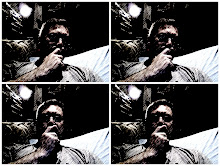
Today is the Anniversary of the first truly great American Artist - Nathaniel Hawthorne.
Many consider The Scarlet Letter to stand with Madame Bovary as two of the most perfect novels written. Other critics have hailed the influence of Hawthorne on the great Master of the novel, Henry James, whose work continually returns to Hawthorne and his themes as a touchstone. To be sure, there is little doubt that The Scarlet Letter was the first great American novel. Contemporaries of Hawthorne believed it the first work by an American to rival novels by British authors. Henry James believed it the first work of art produced by an American. It has been a mainstay of education in the US for more than a century. This work teaches us so much about human psychology, American history, cultural history, use of metaphor and allegory; it teaches us about the weight of the past upon the present and the burden that we as individuals and as a collective bare for what has gone before us. It is a warning and it is permission. It is the conflict of all things American.
So, why is there a sudden increase of silly, foolish, ill-formed or just daft opinions/expressions about Hawthorne appearing on blogs? Several of bloggers/readers (or so they say) need to learn a valuable lesson about great literature; namely, that great works of literature define the reading experience and the reader. You say it is old, out dated, slow, boring, has a bad first chapter, and many other statements? Sadly, these impression define your lack of artistic & cultural maturity and appreciation for one of the most perfect novels in any language.
 If one listens to Beethoven and then states that it is 'bad' music and boring, it says more about the person than it does about Beethoven. Beethoven is clearly anything but boring to those who appreciate pure genius and beautiful music. In truth, both Beethoven and Hawthorne are geniuses of the highest level. One who says that either Beethoven or Hawthorne are boring or old-fashioned needs to develop their sophistication and understanding of great works of art.
If one listens to Beethoven and then states that it is 'bad' music and boring, it says more about the person than it does about Beethoven. Beethoven is clearly anything but boring to those who appreciate pure genius and beautiful music. In truth, both Beethoven and Hawthorne are geniuses of the highest level. One who says that either Beethoven or Hawthorne are boring or old-fashioned needs to develop their sophistication and understanding of great works of art. Aside from his short stories & novels, I strongly recommend reading Nathaniel Hawthorne's American Notebooks. They are a very different experience than reading those of Henry James, Steinbeck, Thomas Mann (Diaries), Robert Musil or even those published by Reynolds Price. The self-mannered awareness that the future will prize their "private" thoughts and ideas is absent. These were truly private workbooks. Hawthorne writes in full voice as someone for whom communication is vital and difficult. Open this work anywhere and read what sounds like the inner voice of someone practiced at concealing his thoughts publicly. Expansive, suggestive, and illuminating for all those who would like to know more of the deep thought and artfullness that went into his major works.
Aside from his short stories & novels, I strongly recommend reading Nathaniel Hawthorne's American Notebooks. They are a very different experience than reading those of Henry James, Steinbeck, Thomas Mann (Diaries), Robert Musil or even those published by Reynolds Price. The self-mannered awareness that the future will prize their "private" thoughts and ideas is absent. These were truly private workbooks. Hawthorne writes in full voice as someone for whom communication is vital and difficult. Open this work anywhere and read what sounds like the inner voice of someone practiced at concealing his thoughts publicly. Expansive, suggestive, and illuminating for all those who would like to know more of the deep thought and artfullness that went into his major works.Some of his working ideas for stories sound absolutely modern. One story idea develops the possibility of having two men talking and discussing their difficulties while waiting and waiting for someone who never comes. They don't know what to do, so they continue to wait and discussing the one who never comes. Sound familar? A little like "Waiting for Godot"? If you love great literature, read Hawthorne again - slowly.... remember, there are no readers, just re-readers.
Hawthorne is a master of the novel and today we remember him as such.






No comments:
Post a Comment